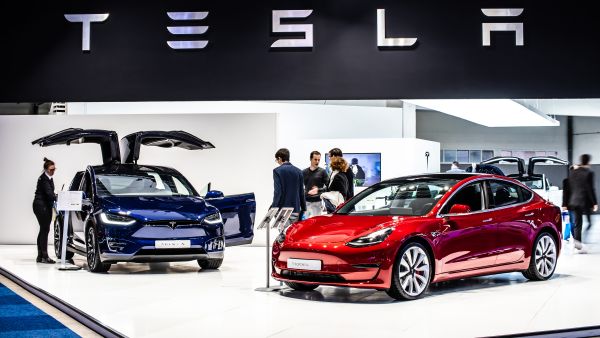As the world tries to tackle the imminent threat of climate change, the discussion over electric cars and how they can contribute to green transportation have been more relevant than ever, especially when it comes to Tesla cars.
Despite being so expensive, Tesla has earned a reputation for being a leading environment-friendly brand. But are people actually buying Tesla cars for their environmental value? Or is it more about the social image it represents? And just how green are electric cars anyway?
Electric cars grab 44% market share in Norway in January https://t.co/dWrxxf1QE7 pic.twitter.com/G6isBsmPkC
— Reuters (@Reuters) February 3, 2020
The sleek technological gadgets and high cost have categorized Tesla as a luxurious brand.
The car's popularity in spite of its high cost is causing people to wonder about the real reasons more and more people are buying it, and whether its sales have been purely driven by environment-conscious decisions or if it's affected by social tendency to look rich.
Who is buying Tesla cars?
According to a study conducted by LendingTree in 2018, Tesla has been purchased by mostly well-off middle-aged people. The study explains that the average household income of a Tesla Model X owner is $143,177 per year, a Tesla Model 3 owner household makes $128,140 per year, and that the median age of Tesla owners ranges between 38-52 years old.
The study also concluded that 88% of the current Tesla Model S and X owners own their own homes.
Musk talked about Demographics last months...briefly.
— ?LOVE?Wifey??? (@FancyCandy101) July 11, 2019
<< Post>>https://t.co/Nj9acv5K6b pic.twitter.com/wZi1nXvjwn
How much does manufacturing a Tesla car cost compared to its price?
As of January 2020, a Tesla Model 3 can range anywhere between $40k and $96k. But how does this compare to the actual cost of manufacturing one?
To learn more about the actual cost of manufacturing a Tesla model 3, a team of German car engineers broke down four cars in 2018 to study its components. According to a Quartz report, the engineers estimate a total of $28,000 in costs to build the Model 3, with $18,000 for materials and $10,000 for labor and production.
We looked at Teslas when we were in Hawaii and US prices were affordable for the cheaper models. Not so in Australia.
— ? Ian McKay (@inxanadudid) January 20, 2020
In the US “The current Tesla car line (Model S, Model X, Model 3) ranges in cost from $35,000 – $124,000 before tax incentives for electric cars.Jul 10, 2019” pic.twitter.com/KA4oVuycUl
How green are electric cars, really?
Even though battery electric vehicles (BEV) have been advertised as the best environment-friendly car option for those who wish to reduce their carbon footprint, experts warn that BEVs may not be as green as we wish.
— The Telegraph (@Telegraph) February 4, 2020
In 2015, the Union of Concerned Scientists published an analysis titled Cleaner Cars from Cradle to Grave: How Electric Cars Beat Gasoline Cars in Lifetime Global Warming Emissions, revealing that producing a midsize, midrange (84 miles per charge) BEV like the Nissan Leaf typically “adds a little over 1 ton of global warming emissions to the total manufacturing emissions, resulting in 15 percent greater emissions than in manufacturing a similar gasoline vehicle.”
The greenest machine is the one in your garage. Electric cars are clean, but building them is a dirty business, writes @ST_Driving’s Nick Rufford https://t.co/HHcfLbg8pi pic.twitter.com/wRszRA0QwS
— ST News Review (@ST_Newsreview) February 9, 2020
Additionally, the process through which lithium-ion batteries used in electric cars are made requires extracting raw earth materials using drilling, a process that causes a lot of damage to the environment, according to experts.
Unfortunately, we can’t claim that BEVs are totally green unless electricity used to run it is generated by clean sources like water, solar or wind. Yet, most countries around the world still generate electricity using either coal, natural gas, or nuclear energy. Vinod Khosla, co-founder of Sun Microsystems highlights this in his saying: “electric cars are coal-powered cars.”
With all this information, questions continue to mount regarding people's real motives to buy a Tesla as opposed to other, more affordable but less fancy electric cars, especially that more luxury car manufacturers are considering electricity-powered vehicles and bracing for huge success, most notably with Porsche Taycan Turbo S which can get to 60 almost as fast as a Tesla.
New 2020 Porsche Taycan: full electric 4-door coupe
— Earl Karanja (@Earlsimxx) September 4, 2019
Features: AWD, 2 speed trans
Taycan Turbo S
Output: 761hp, 1050nm
Top Speed: 260km/h
0-100km/h: 2.8s
Range: 412km
Price: €185,456
Taycan Turbo:
Output: 680hp
Top Speed: 260km/h
0-100km/h: 3.2s
Range: 450km
Price: €152,136 pic.twitter.com/D8WYwkEtzG







